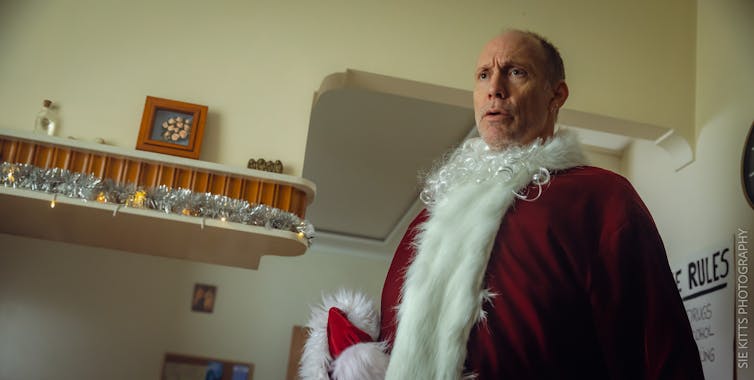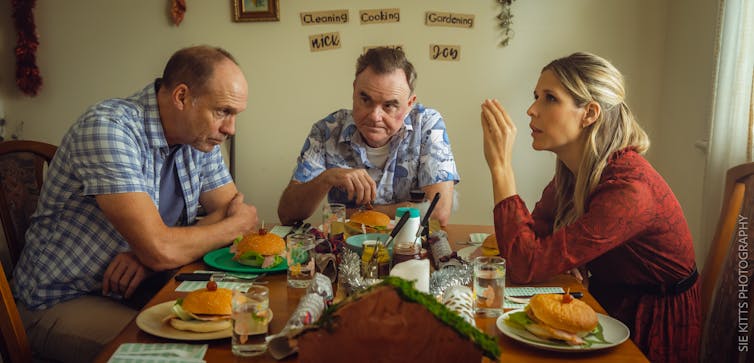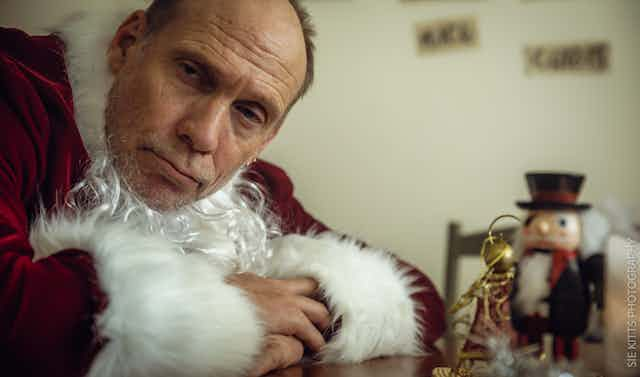Bona fide Christmas films usually fit into one of the following categories.
There are the sardonic comedies poking fun at the consumerist undertones of the holiday (National Lampoon’s Christmas Vacation, Gremlins). There are the cheesy, schmaltzy Christmas fantasy films (The Christmas Star, Prancer) that strain to impart some of that good ol’ Christmas miracle to the viewer. There are the camp, deliberately kitsch bodgy romps like the Hulk Hogan vehicle Santa with Muscles. And there are the social realist dramas about people just trying to make it through the stress of the period (Almost Christmas).
This is not to mention the numerous Christmas horror films – anti-Christmas films? – that skewer the joy of the holidays with things like axe-wielding Santas (Silent Night, Deadly Night), deranged, obscene phone-calling maniacs (Black Christmas) and evil Krampuses looking to punish the naughty of every stripe (Rare Exports).
Christmess, the latest film from writer-director Heath Davis, fits firmly in the social realist mode.
Alcoholic ex-film star Chris (Steve Le Marquand) leaves rehab and moves into a halfway house with just over a week until Christmas. Living with his sponsor, Nick (Darren Gilshenan), a self-professed Yulephile, and musician and recovering addict Joy (Hannah Joy), he works hard to get his life on track and secures a job as a Santa at a suburban mall. But various obstacles – like bumping into his daughter Noelle, estranged for 20 years – impede his efforts.
As he attempts to develop a relationship with his daughter, he discovers, alas, that despite the optimism of people like his sponsor Nick, simply apologising isn’t always (or even often) enough, even if, as Nick is fond of saying, “Christmas is the time for forgivin’.”
There’s no glorious overcoming or transcendence at the end of the film, and anything that could be interpreted as a “Christmas miracle” is minor to say the least. But there is a definite sense of the development of genuine friendship between the characters, and a sense that the grey world Chris inhabits is at least a few shades warmer by the end of the film (even if, as is so often the case with addicts, macro-level patterns repeat).
Rather than dampening the film, the minor stakes make it a more touching experience – and it is an emotionally engrossing film, satisfying in its combination of melancholy tinged with the vague outlines of hope.
Read more: Christmas films: there might be some truth to stories about hometown romances, according to research
Carefully observed details
For a low-budget independent film to be successful – and this is a true independent film, which in Australia means no investment from any of the major screen bodies – it needs to be as close to flawless as possible across three fronts.
It needs to look good by embracing a suitable (and usually low-key) aesthetic, it needs to feature excellent actors, and the writing needs to be razor sharp. Christmess succeeds in each area.
The performances, particularly by seasoned veterans Le Marquand and Gilshenan, are exceptional.
Le Marquand has long been one of Australia’s most underrated stars of stage and screen – watch him in Two Hands or Last Train to Freo and it’s hard to understand why he hasn’t developed a longer Hollywood resume – and he effortlessly commands the attention of the viewer here.

Gilshenan, best known for television comedies like The Moodys and Full Frontal, is superb as the kind (if a touch sanctimonious) AA sponsor. Hannah Joy, lead singer and guitarist of Middle Kids, breaks up the drama with some beautifully performed songs.
The dialogue is naturalistic, fitting the minor tenor of the film, with some subtle bursts of wry humour punctuating the drama.
“Most Santas aren’t NIDA graduates,” Chris says to his employer. “You’d be surprised,” she barks in reply.
“I lied,” Chris says to Nick at one point, “I’m an actor and an addict, what’d you expect?”
The cinematography by Chris Bland is excellent – it looks like it’s been shot for cinemas and not streaming, making the most of the wide aspect ratio and long lenses, with the handheld style recalling the imagery of more savage suburban movies like Snowtown.
The film is full of carefully observed details that situate it within a Sydney milieu, capturing the sad banality of so much of suburban life. Unkempt, rubbish-strewn canals, ugly and depressingly empty shopping malls, carefully manicured weatherboard houses – all the stuff they tried to make us forget about during the Sydney Olympics.
At the same time, there are details anyone who’s spent a Christmas in Sydney would immediately recognise: the glorious but slightly unhinged light displays that seem out of place without snow peppering them; a dying Christmas tree, rescued from a fruit shop; much complaining about the heat, as an ancient air conditioner fruitlessly struggles to do its work. There are the ubiquitous Christmas warehouse stores, a barbecue, yellow brick houses, small, carefully mowed lawns, and lots of sweat.

The film’s only weakness – and it’s minor – is the score, which seems a little uninspired but, thankfully, is used minimally.
Christmess is an exceptionally well-crafted independent film punching well above its weight in terms of budget. It lingers in the imagination far longer than most Hollywood-scale productions.
There’s a subtlety to it unusual for contemporary cinema, which tends to browbeat viewers in an insufferably didactic register. It wouldn’t surprise me if this were at the top of lists of Australian Christmas movies. It’s undoubtedly one of the best Christmas films to emerge – from anywhere – in recent years.
Christmess is in cinemas from today.
Read more: Christmas Ransom: I quite enjoyed watching this (terrible) new Aussie Christmas film

